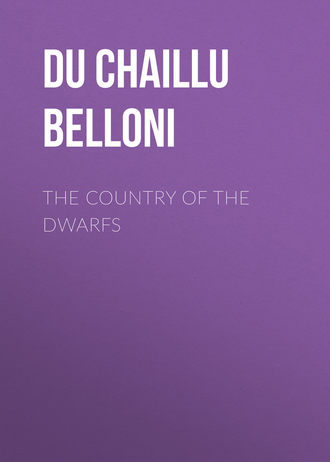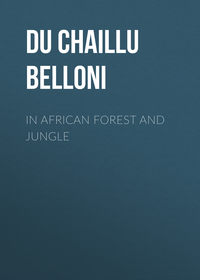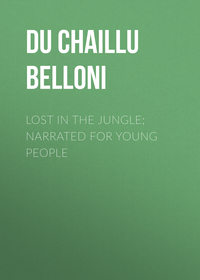 полная версия
полная версияThe Country of the Dwarfs
Then, after I had taken my meal, I thought it would be better to burn some of my clothes which were saturated with blood, so that the natives might not suspect that I had been wounded, for they all thought I was a spirit, and consequently invulnerable to the implements of war. So we lighted a larger fire, and the blood-stained clothes were burned. After this I laid down to rest a little, but not before I had offered a silent thanksgiving to that gracious Providence who had so marvelously preserved my little band of followers and myself.
We rested for the remainder of the night on the hard ground, and at daylight continued our march, but mistook the path, and finally came to a plantation belonging to an old man, the next in authority to the king of Niembouai-Olomba. By that time it was midday. He had heard of our fight a short time before. We were received kindly by the old man, and, after we had partaken of the food his people had cooked for us, my men gave him an account of our deadly encounter with the Ashangos.
Then the old man said, "What an Oguizi you have had with you! It is no wonder that none of you were killed, for I have heard by the messenger that brought the news that sometimes he would hide and change himself into an elephant, and charge the Ashangos, and throw fire from his trunk, and would then become a man again. At other times we hear that the Oguizi turned himself into a leopard, and as the sharp-shooters came after you he pounced upon them from the branches of the trees, and that when tired of being a leopard he would transform himself into a gorilla, and roar till the trees of the forest shook and toppled down upon your enemies. The Mouaou-Kombo and Mobana people sent us word that we must fight you, but their quarrels are not ours. We are your friends."
But there was no time to be lost on the way, and after a little talk we bade good-by to our kind host, and once more directed our steps toward the setting sun.
CHAPTER XXX
CONCLUSION. – RETURN TO THE COAST. – DESOLATION OF THE COUNTRY. – FATE OF OLD FRIENDS. – REACH THE SETTLEMENT. – DEPARTURE FOR ENGLAND. – AU REVOIRI need not recount to you our journey back, only that there was no more fighting, and that we returned by exactly the same road we had taken going eastward, reached the same villages, and were received every where with great kindness by the different tribes and their chiefs, who seemed all so glad to see us. Kombila, Nchiengain, Mayolo, begged me to come back again. But, when we reached the Ashira country, I did not go to see Olenda's people, nor did we stop at any village belonging to his clan, but went and tarried at Angouka's village, where we were hospitably welcomed, his people saying, "Why did not Quengueza bring you to us instead of taking you to Olenda?" Then we glided down the now placid waters of the Ovenga and the Rembo.
From the Ashira country to the sea-shore a picture of desolation every where met our eyes. The poor Bakalais seemed to have suffered heavily from the plague; many of their villages were silent, and as we entered them nothing but grim skeletons was presented to our view. Obindji, Malaouen, and my hunters were all dead; three men only were left of the Obindji village.
But when I reached Goumbi the havoc made by the plague seemed the most terrible of all. Every one of the nephews of the king who had gone to the Ashira country with us was dead; all my friends were dead. I felt the sincerest compassion for poor Quengueza: Goumbi had been abandoned, and all his warriors, his slaves, his wives, his family, his children, had been taken from him.
This plague had been a fearful visitation, and hundreds of thousands of people must have been carried off by it.
Finally I reached my settlement on the River Commi, and on my way there I missed many faces; but I was rejoiced that friend Ranpano's life had been spared. How glad the good old chief was to see me! He gave me back the shirt I had given him on my departure. "I knew you would not die," said the old chief.
We had all returned safely but one – Retonda. Many of those who had said of us when we started upon our journey, "We shall see them no more; they are going into the jaws of the leopards; they are courting death," were no more. The plague, which had spared us, had swept them away.
I had gone safely through pestilence, fire, famine, and war, and when I looked at the sea once more my heart rose in gratitude to that God who had so marvelously watched over me, the humble traveler in Equatorial Africa.
I found at the mouth of the river an English trading-vessel ready to start for London. The name of the vessel was the Maranee, Captain Pitts, and six days after my arrival on the coast, at the close of the year 1866, I sailed for England.
And thus I left the shores of Equatorial Africa, followed to the beach with the blessings and good wishes of its inhabitants.
Since that time years have gone by, but I think often of the fierce encounters I have had with the wild beasts in that far-off country; of our camp-fires; of the Dwarfs; of dear, good Quengueza; of my hunters, Aboko, Niamkala, and Fasiko; of Malaouen, Querlaouen, Gambo; of friend Obindji, the Bakalai chief of Mayolo; of Ndiayai, the king of the Cannibals; of Remandji; of my brave boys, Igala, Rebouka, Mouitchi, Ngoma, Rapelina, Igalo, and dear Macondai, and of other friends, and I hope that I may meet them again in the Spirit Land.
And now, my dear young friends, let us bid forever adieu to the regions of Equatorial Africa, whither I have taken you in imagination, and concerning which I have given you a faithful record of what I did, saw, and heard there.
I think we have had some pleasant hours together, and, at the same time, I hope that your knowledge of that unknown part of the world has been enlarged by the reading of the volumes I have specially written for your benefit.
Let us always be friends, and when I travel again in distant lands I shall not fail to tell you what I have seen in my journeyings.
Norway, Sweden, and Lapland are the countries where I am going to take you next. Meanwhile I say good-by.
1
Explorations in Equatorial Africa.
2
See chapter on "The Sorrows of Birds," in "Wild Life under the Equator."
3
On the first page of each journal I had written, "Copy of Du Chaillu's African Journal. Should death overtake me, and should these my journals find their way to a civilized country, it is my wish that Messrs. John Murray, of London, and Harper & Brothers, of New York, shall publish an account of my journey, if they feel inclined to do so.
"P. B. Du Chaillu."



